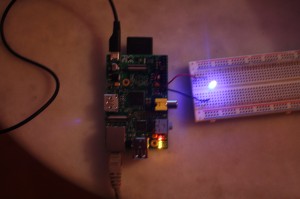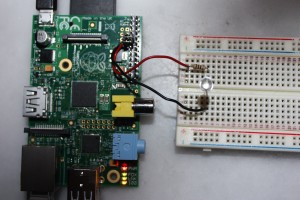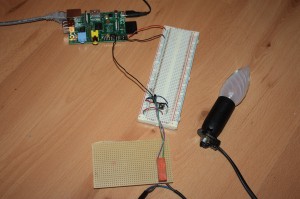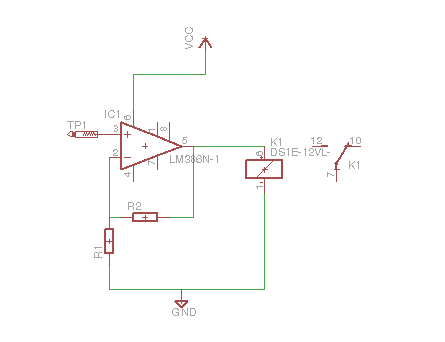We like pumpkin and for halloween we decide to create with our raspberry pi a motion sensor.
How it’s works ?
The idea is simple, when somebody is in the piece, the lamp is putted on.
Discover Raspberry pi
First step, we install a debian on ourraspberry pi.
Second step, we need to start a lamp with the gpio of the raspberry pi.
GPIO are input output spindle, we can have a high voltage (3.3 V) or low voltage ( 0V ).
We can see on the following picture, how to are the GPIO dispatched.

The first thing we do was to put on a LED. This was done by simply connecting a LED to the GPIO 17 and a resistor in serie.
We define the gpio 17 and we use this as an output :
echo "17" /sys/class/gpio/export echo "out" /sys/class/gpio/gpio17/direction |
And to enable the led, we put the voltage high :
echo "1" /sys/class/gpio/gpio17/value |
Note : to put off the led we simply replace « 1 » by « 0 »
Create a motion sensor with a webcam
In practice, we could use a infrared motion sensor. However we only have a webcam, and it’s more challenging with a webcam.
The code is available in the archive.
int main(int argc, char **argv) { // Initialization GPIO 17 // Image IplImage *image1=NULL; IplImage *image2=NULL; IplImage *subImage=NULL; // Capture movie CvCapture *capture; // Open the webcam with the number of the device (/dev/videoX for X the number) capture = cvCreateCameraCapture(atoi(argv[1])); //Configure the resolution for the webcam cvSetCaptureProperty(capture, CV_CAP_PROP_FRAME_WIDTH, 640); cvSetCaptureProperty(capture, CV_CAP_PROP_FRAME_HEIGHT, 480); cvSetCaptureProperty(capture, CV_CAP_PROP_BRIGHTNESS, 0.65); // Check if capture is ok if (!capture) { printf("Ouverture du flux vidéo impossible !\n"); return 1; } printf("Enjoy !"); // We start our lamp 2 time for check and give the signal while(1) { // Screen first picture image1 = cvQueryFrame(capture); // Waiting 50 milisecondes cvWaitKey(50); // Save image 1 cvSaveImage("buffer1.jpg",image1,0); // Screen second picture image2 = cvQueryFrame(capture); // Save image2 cvSaveImage("buffer2.jpg",image2,0); // We save both picture image1 = cvLoadImage("buffer1.jpg", CV_LOAD_IMAGE_GRAYSCALE); image2 = cvLoadImage("buffer2.jpg", CV_LOAD_IMAGE_GRAYSCALE); // We substract image1 and image2 subImage = substract(image1, image2); // We count the number pixel difference of the image 1 and image 2. int trigger = count(subImage); // We compare with our TRIGGER, if we detect mouvement if(trigger > TRIGGER) { // if more pixel modify we start the lamp } } // Free capture cvReleaseCapture(&capture); return 0; } |
Assembly
Ok, now the program works but we have a problem with GPIO . to put on our lamp we need 5V. For this reason we use a relay in 5V.
However, the raspberry pi ‘GPIO can only provide 3.3V. We need to amplify the signal.
We use the output 5V of the raspberry and an audio amplify (LM386) in non inverting scheme.
We can see the assembly :
Final result
OVERSIMPLE : Halloween détecteur de mouvement par oversimple
Source
Codes : complete source code
It’s Oversimple isn’t it?





